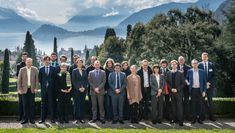Due to the ongoing digitalization, as well as the use of big data technologies, AI systems and autonomous machines, legal science is increasingly facing regulatory and conceptual challenges. The development of adequate solutions relies on interdisciplinary approaches and external expertise. Therefore, the ability to look beyond the confines of their own discipline is becoming more and more important for legal scholars.
In light of the above, the symposium “Legal Foundations in Times of Deep Learning and Systemic Digitalization” assembled experts in the fields of law, architecture, automotive engineering, sociology and urbanism from Austria, Belgium, Germany, Italy and Switzerland at the Villa Vigoni German-Italian Centre for Excellence at Lake Como, Italy, from April 3rd to 6th, 2018. This interdisciplinary and international conference was co-organized by Prof. Dr. Iris Eisenberger, M.Sc. (University of Natural Resources and Life Sciences, Vienna), Prof. Dr. Konrad Lachmayer (Sigmund Freud University Vienna), Dr. Valerio Lubello (Bocconi University, Milan), Prof. Indra Spiecker gen. Döhmann, LL.M. (Goethe University Frankfurt) and Prof. Arianna Vedaschi (Bocconi University, Milan).
The academic programme started with a panel discussion on “Deep Learning and Systemic Digitization – Legal and Technical Foundations”. The debate centred around issues of informational self-determination, the regulatory diffusion of potential dangers related to digitalization as well as the role of the digitalized human in general. There was a broad consensus about the current lack of adequate regulation of IT-related issues and the need to reinforce public debate around them. Moreover, the discussants stressed the importance of safeguarding human participation in decision-making processes and thus preventing potential losses of sovereignty due to increasingly autonomous decision-making by technology.
Entitled “Black-Box Decisions: Accountability and Responsibility”, the second panel was concerned with the attribution of liability to legal entities and the challenges autonomously acting systems pose to traditional legal concepts. In criminal law in particular, these developments raise fundamental questions in relation to the doctrine of criminal responsibility as well as the functionality of criminal law in general. Because the decisions of autonomous systems often result from black box processes that elude human understanding, the procedural seizure of data is proving to be problematic. In this regard, legal provisions for the design of said systems could be part of the solution.
The first day concluded with a panel on artificial intelligence (AI) focusing primarily on questions surrounding digital profiling and the regulation of systems trained by “deep learning”. In the context of self-learning technologies, both the quantity and quality of the provided data, as well as the limitation of their application areas, were found to be of central importance.
The second day of the conference was devoted to autonomous mobility with particular attention paid to feasibility scenarios from both technical and urban planning perspectives, the rights of disposition and data ownership, as well as the attribution of liability in the context of autonomous driving. Sectoral regulation of mobility data was considered the most appropriate to solve the specific issues of data protection.
The closing panel on the third conference day discussed the limits of what law could provide and the possibilities of informational regulation. The fragmented and casuistic acquis in data and information law inhibits the appropriate dealing with relevant cases and underlines the need for a codification of the fundamental principles of these fields.
Overall, the participants concurred that the challenges law is facing due to technological developments call for a fundamental paradigm shift: Where regulation through legal means is inappropriate or unfeasible, new technical regulatory concepts must compensate and assume the functions formerly held by law.
Mag. Lukas Wieser

